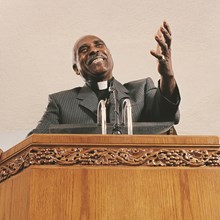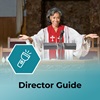As small-group leaders, we can learn how to lead vibrant, life-changing groups from a variety of sources, and we should always be looking to learn more. Why? Because God uses what we do to transform lives and grow his kingdom.
Last month, I viewed the Preach Better Sermons conference webcast from Preaching Rocket, featuring some of the best preachers and presenters around. While watching and listening, I made some of my own applications for leading a small group.
Create tension. Andy Stanley talked about how he deliberately creates some tension in the beginning of his message to get people to say, "Tell me the answer to that question or problem." Stanley said, "You're never bored when there's tension."
You can do the same as you lead your group. Boil down your lesson purpose or main idea into one tension-building question that your study will eventually answer. Make it as personal as possible, and you'll draw people into a dynamic discussion. For instance, a study on James 1 could center on the key question: Is Christianity all about behavior modification?
Be the real deal. Teachers who make an impact on their audiences don't take themselves too seriously, said Jeff Foxworthy. People relate to speakers and leaders who are authentic and open with their lives. Don't hide your struggles and hurts. While you must show wisdom when you share, be transparent and vulnerable.
Focus on others. "You cannot be thinking about yourself and make an impact on someone else," said Dr. Charles Stanley. Focus on what your group members need in order to grow, not on how well you present the lesson or on sharing your own thoughts or ideas. Dr. Stanley discussed his six-step process for developing a sermon. You can apply these to how you prepare for your group:
- What does my audience need? This is where Jesus always started when he taught. If you miss this question, your discussion may be good, but irrelevant.
- What's the text that best helps them meet that need? Let Scripture speak into their needs and into their lives.
- What does this text say? You must always deal with what God's Word says before you can apply it to your lives.
- Gather material that fits the need and text. Do you have stories to share? Particular questions to ask to get people to share their stories? Ways of illustrating a truth? A group exercise to use?
- Pray. Of course you should pray throughout your preparation process, but take time to be sure you're hearing from God. Ask God, "What do you want the people in my group to get and not forget?"
- Outline. As a small-group leader, this is where you put structure to your study and discussion. Outline the key points you want your group members to walk away with and jot down a few questions to get them there. It's key to narrow down your points.
Lead with the end in mind. Vanable Moody calls this "behavioral preaching," and contended that Jesus was a behavioral preacher. Do you want to make an impression or an impact? Lead your small-group study with the end in mind. It's not enough to lead a great meeting. Ask yourself, What behaviors do we want to see because of this discussion? What change in behaviors do we want to occur?
Make it practical. Moody also encouraged preachers to give people an opportunity or vehicle to apply the teaching, an area where many pastors come up short. As small-group leaders we can come up short here, too. Provide a very specific opportunity for your group members to live out what you are discussing. Move the conversation from people's heads to their hearts, and then to their hands. This will take some creativity and also require you to step out of your comfort zone. Get your group off comfy couches and love seats and into real-life ministry to one another and others.
—Michael Mack is an editorial advisor for SmallGroups.com and writes on small-group leadership. This article is excerpted from his blog and used with permission.









